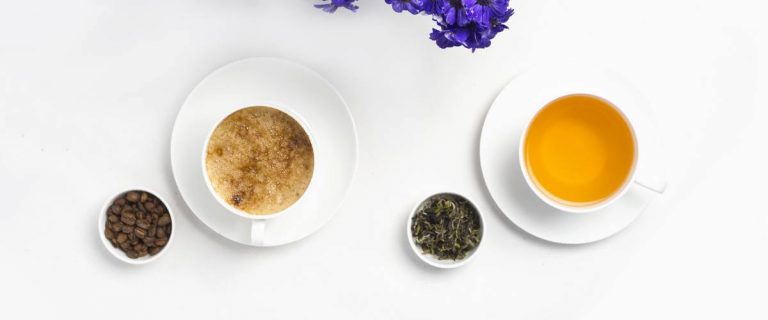The world is mostly divided into two types of people, tea lovers and coffee lovers! With a few obvious similarities, tea and coffee are the most popular beverages around the globe. Despite the fact that both the drinks contain caffeine in its natural state, their true essence lies in the differences between the two.
An opposing history
Tea and coffee have stimulating histories with legendary wars waged for the access of both. Although the true history of tea is cloaked in the mists of time, the drink is known to have originated over 3000 years ago in China.
The emperor, Shennong was enamoured by this beverage after tasting it accidentally during a journey through the forests. A sprig of tea leaves fell into the water that was being boiled for him, and thus the first cup of tea was created. Although, this event could be an urban legend, as there aren’t any available written records to verify the story.
On the other hand, coffee is a relatively recent discovery. A Yemeni farmer in the 1400s discovered the stimulating effect produced by coffee beans in the wild, all by accident. While letting his animals graze, he noticed that the beasts couldn’t sleep after eating off the strange shrub. While he chewed on the beans himself, he experienced what we now recognise as a ‘coffee rush’.
Growing and cultivating
Tea and coffee are usually grown in regions with a tropical climate. Being evergreen plants, both can grow to large sizes, but are trimmed to maintain workability during harvesting.
Since sunlight, soil, climate among other factors affect the taste of each of these shrubs, cultivators spend a large chunk of their lives trying to understand more about the intricacies of growing tea or coffee.
The bean and the leaf: caffeine content
While the beans of the coffee plant are used to make the beverage, the leaves of tea are boiled to prepare the brew. With approximately 55 mg of caffeine in a cup of black tea, it is found that different teas have varying caffeine levels. While green tea contains one-third the amount of caffeine in black tea, oolong has about two-thirds.
Caffeine in tea enhances smell and taste, while increasing concentration and takes a while to enter the blood stream. Coffee on the other hand has 125-185 mg of caffeine per cup. It has been observed that coffee drinkers experience an immediate lift.
Processing
Coffee
Coffee plants are cultivated as Coffea Robusta/Canephora and Coffea Arabica, with the latter being the preferred variety. Several processes are involved while making roasted coffee. Once the beans are hand-picked and sorted according to the ripeness and color, the berry’s flesh is removed and fermented to eliminate a mucilage layer. The beans are then washed, dried and roasted.
Every method of coffee preparation requires roasted beans that are ground that is mixed with hot water with the un-dissolved particles strained.
Tea
Mainly cultivated in tropical and sub-tropical regions, tea is grown in two varieties namely large-leaved Assam tea and small-leaved China tea. After plucking the leaves from the plants, it is sent to factories for processing.
The terminal bud, young shoot and two adjacent leaves are plucked for this process. Stages that follow include withering, fermentation, rolling and drying the processed flush. Once dried, the leaves are sorted for sale.
Being a popular drink, tea can be served cold or hot with milk, flavors, lemon, lime or masala. Making tea involves using the leaves in a teapot, infuser or cup, to which hot water is added. While the leaves slowly infuse in the water, sugar and milk can be added. Once done, the liquid is strained out and sipped on hot.
Caffeine in tea vs coffee
When brewed, coffee has more caffeine than steeped tea because it is a stronger drink, but there is more caffeine in tea leaves than coffee beans. Note that only after being brewed does coffee contain more caffeine than tea.
So if you’re wondering how much caffeine is present in a cup of coffee, the answer is 70 – 140 mg of caffeine, this is probably why people think tea is the healthier choice. While the caffeine content in tea can go up to 140mg, caffeine in black tea is 20mg and caffeine in green tea is 35mg.
Health Benefits of tea vs Coffee
The list of health benefits in tea is long, from fighting inflammation and boosting brain heath, to help lowering the risks of heart diseases and strokes. Coffee, on the other hand, is a rich source of antioxidants and its regular consumption has been linked to protection against 2 diabetes, Parkinson’s and certain cancers.
In conclusion, caffeine content in coffee is more than that in tea when brewed, this being said whether the tea is better for you or coffee is a choice you will have to make.

Comments are closed.